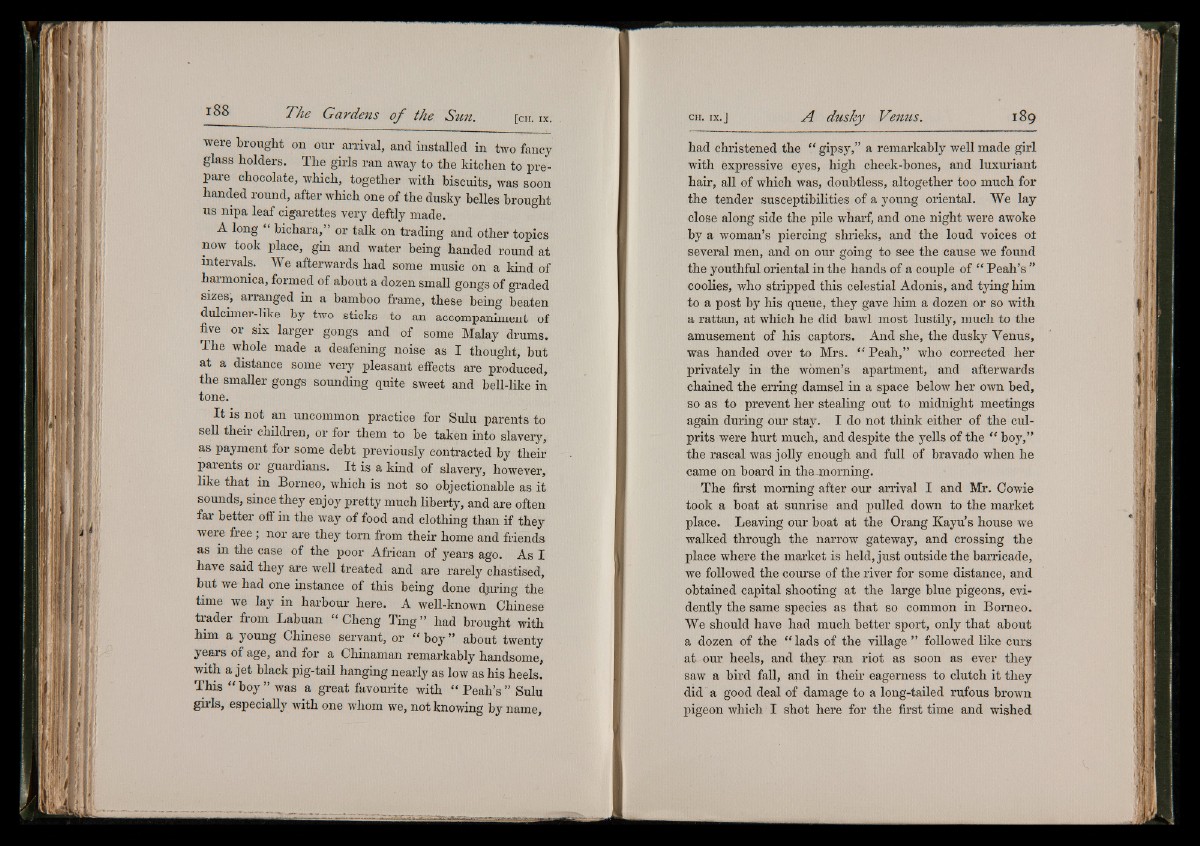
were brought on our arrival, and installed in two fancy
glass holders. The girls ran away to the kitchen to prepare
chocolate, which, together with biscuits, was soon
handed round, after which one of the dusky belles brought
us nipa leaf cigarettes very deftly made.
A long bichara, or talk on trading and other topics
now took place, gin and water being handed round at
intervals. We afterwards had some music on a kind of
harmonica, formed of about a dozen small gongs of graded
sizes, arranged in a bamboo frame, these being beaten
dulcimer-like by two sticks to an accompaniment of
five or six larger gongs and of some Malay drums.
The whole made a deafening noise as I thought, but
at a distance some very pleasant effects are produced,
the smaller gongs sounding quite sweet and bell-like in
tone.
It is not an uncommon practice for Sulu parents to
sell their children, or for them to be taken into slavery,
as payment for some debt previously contracted by their
parents or guardians. It is a kind of slavery, however,
like that in Borneo, which is not so objectionable as it
sounds, since they enjoy pretty much liberty, and are often
far better off in the way of food and clothing than if they
were free; nor are they torn from their home and friends
as in the case of the poor African of years ago. As I
have said they are well treated and are rarely chastised,
but we had one instance of this being done djiring the
time we lay in harbour here. A well-known Chinese
trader from Labuan “ Cheng Ting ” had brought with
him a young Chinese servant, or “ boy” about twenty
years of age, and for a Chinaman remarkably handsome,
with a jet black pig-tail hanging nearly as low as his heels.
This “ boy” was a great favourite with “ Peah’s ” Sulu
girls, especially with one whom we, not knowing by name,
had christened the “ gipsy,” a remarkably well made girl
with expressive eyes, high cheek-bones, and luxuriant
hair, all of which was, doubtless, altogether too much for
the tender susceptibilities of a young oriental. We lay
close along side the pile wharf, and one night were awoke
by a woman’s piercing shrieks, and the loud voices ot
several men, and on our going to see the cause we found
the youthful oriental in the hands of a couple of “ Peah’s ”
coolies, who stripped this celestial Adonis, and tying him
to a post by his queue, they gave him a dozen or so with
a rattan, at which he did bawl most lustily, much to the
amusement of his captors. And she, the dusky Yenus,
was handed over to Mrs. “ Peah,” who corrected her
privately in the women’s apartment, and afterwards
chained the erring damsel in a space below her own bed,
so as to prevent her stealing out to midnight meetings
again during our stay. I do not think either of the culprits
were hurt much, and despite the yells of the “ boy,”
the rascal was jolly enough and full of bravado when he
came on board in the morning.
The first morning after our arrival I and Mr. Cowie
took a boat at sunrise and pulled down to the market
place. Leaving our boat at the Orang Kayu’s house we
walked through the narrow gateway, and crossing the
place where the market is held, just outside the barricade,
we followed the course of the river for some distance, and
obtained capital shooting at the large blue pigeons, evidently
the same species as that so common in Borneo.
We should have had much better sport, only that about
a dozen of the “ lads of the village ” followed like curs
at our heels, and they ran riot as soon as ever they
saw a bird fall, and in their eagerness to clutch it they
did a good deal of damage to a long-tailed rufous brown
pigeon which I shot here for the first time and wished